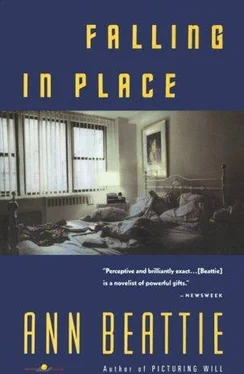Ann Beattie - Falling in Place
Здесь есть возможность читать онлайн «Ann Beattie - Falling in Place» весь текст электронной книги совершенно бесплатно (целиком полную версию без сокращений). В некоторых случаях можно слушать аудио, скачать через торрент в формате fb2 и присутствует краткое содержание. Год выпуска: 1991, Издательство: Vintage, Жанр: Современная проза, на английском языке. Описание произведения, (предисловие) а так же отзывы посетителей доступны на портале библиотеки ЛибКат.
- Название:Falling in Place
- Автор:
- Издательство:Vintage
- Жанр:
- Год:1991
- ISBN:нет данных
- Рейтинг книги:4 / 5. Голосов: 1
-
Избранное:Добавить в избранное
- Отзывы:
-
Ваша оценка:
- 80
- 1
- 2
- 3
- 4
- 5
Falling in Place: краткое содержание, описание и аннотация
Предлагаем к чтению аннотацию, описание, краткое содержание или предисловие (зависит от того, что написал сам автор книги «Falling in Place»). Если вы не нашли необходимую информацию о книге — напишите в комментариях, мы постараемся отыскать её.
Falling in Place — читать онлайн бесплатно полную книгу (весь текст) целиком
Ниже представлен текст книги, разбитый по страницам. Система сохранения места последней прочитанной страницы, позволяет с удобством читать онлайн бесплатно книгу «Falling in Place», без необходимости каждый раз заново искать на чём Вы остановились. Поставьте закладку, и сможете в любой момент перейти на страницу, на которой закончили чтение.
Интервал:
Закладка:
“Unhygienic,” the nurse said. “This is your mother’s cook? I like your mother, though. She’s a fine lady. I’m sure this cook is the right person for the job if your mother thinks so.”
He took Mary’s hand. It was small and tender. He moved his hand over hers, stroking, wondering how her hand could be so warm in such a cool room if she had no fever. He remembered Nina’s hand on his head, and the way she had asked, “Are you in shock?” In fact, he had been — or out of his mind, at least. To prove that he was sane, he had tried to re-create for Nina his trip into New York, but he had gotten bogged down trying to remember whether he said goodbye to Louise or not. He thought he had been in the house and then left, but maybe he had been in the house only when Tiffy was there, before he knew what had happened, when he came home and saw the police car blocking his driveway. He had once joked to Nina that there were pillars, and she had believed it. He could imagine pillars, rising up, 2001 music playing as they went higher and higher. He could not imagine living in that house again, and he wondered if Mary could, either. He was holding her hand, and it was still as warm, as clammy. He bent over and kissed her hand, and she drew it away. There was a Band-Aid in the crook of her arm, from the intravenous. A bruise spread out beneath the Band-Aid. The nurse had put it there, because, she said, looking at needle marks and bruises was upsetting. “Everyone isn’t like me. Other people aren’t accustomed to things that are physically ugly, and it’s easy to forget that. I always try to remember that the patient is the patient, and I am me.
Mary in her gingerbread-man bathing suit. Mary in her white bag of a hospital gown. Mary herself. He had been so surprised to have a baby, and then two, and then three. Different-sized children. Mary the first of them. It made him sentimental in a way he couldn’t remember being sentimental before. If she could be born again, it would be in low light, with music playing, and he would be there, humming along with the music. That would certainly make him pass out, if just being in the hospital made him queasy. Mary’s birth. The time before Mary. The time before Louise. If you could only go backward, however awkwardly, like running backward without looking, depending on memory so that you didn’t crash into something, hoping some sixth sense would protect you. Going backward that way as an adult would be like a small child’s going forward — your footing unsure, trusting a hand to be outstretched at the crucial moment, for a table to be sturdy and not light. To be able to walk, to balance, to progress. He remembered Mary toddling, Louise luring her with some toy, shaking an elephant or a lion, calling to her, “Come on, Mary. That’s right.” Mary hanging back, gripping his thumb, wanting to go but afraid of all that space between hands, the gap between what was behind her and the lion. Then she had half-run forward, awkwardly, and grabbed the prize. Someone had told him (Tiffy? One of the policemen? Somebody, anyway) that she had just fallen, and there had been no scream that Louise or Tiffy had heard. (That’s right, Tiffy had told him.) They had just gone out into the backyard and there they all were, four of them standing and one on the ground, as silent as actors about to begin a pantomime. But then Louise had started screaming. Her screaming had made Parker cry, and John Joel. And then Parker ran across the field, shouting back that the gun wasn’t his, that John Joel had done it, and John Joel had waited in the house, upstairs in his room. He had been sent to his room, like a bad boy, until the ambulance got there. Louise kept trying to move Mary, to shake her, tug at her. Tiffy had had a hard time convincing her to let her be still. His daughter, lying still on the ground. Still in a hospital bed. Her stillness had made him move erratically, frantically. Suddenly he was not at the hospital, not at the house in Connecticut, but in New York, in the familiar garage, talking to a taxi driver, getting out at Columbus Avenue, opening the door and going up the stairs. It hadn’t been until then that the tiredness had hit him — the tiredness and the shock. It was like trying to wish yourself awake from a bad dream, steps and more steps, like layers upon layers, and he couldn’t make a sound. There had been a little noise on the street, but inside the building, nothing. It was quiet, like the floor of the ocean, and he was trying to reach the top. He could feel the sweat running down his face, and from somewhere far-off — not from any place he could identify — he was watching himself move forward, step after step, moving in slow motion to reach the landing. Moving deliberately in slow motion, perhaps, because what could he say? And if he said it, what could she do? What did he want her to do? What had John Joel wanted from Mary? He had wanted to be rid of her. He had wondered if telling Nina would frighten her, make her go. He didn’t want that. He wanted her, he wanted not to be swimming, to bound up the stairs, minus bouquet and top hat but still charming, ready for… She did not open the door, of course, in a long gown, and he did not take her in his arms for a dance. There was no graceful movement at all. He was exhausted from the climb, and the man-he had stood and gaped at the man as surprised as if the man were naked. And then Nina had said the man’s name, and that she had not slept with him, no matter what he was thinking. He was thinking: I’m alive. Even Mary is alive. My son shot my daughter. But it was impossible to talk about it. Everything went on, in slow motion. His following her into the kitchen, his legs so heavy that he could not believe that they were not ballooning. She had been cutting fruit. Simply fixing breakfast, cutting fruit. He had walked into ordinary life, and the little accidents of ordinary life — Nina’s cut finger. While she was gone he had continued to peel and chop the orange. The juice ran down his hands and wrists. He was holding the peeled orange, baseball-sized but soft, soft and juicy, it must have been like something the doctors had seen inside Mary’s body. Didn’t medical students practice cutting oranges because oranges were like certain tissues in the body? Oranges punctured with needles, as they learned to give injections? He held the peeled orange and stared at it. Then he put it on the chopping board and chopped it, sprinkled the wet pieces over her bowl of cereal. He waited for her to come back. He went to the bathroom door and saw her, washing her sleeve, bandaging the finger. He had wanted to tell her all of it, in detail, but he hadn’t been there, he would have to make the details up. He could describe the field, the day, but the blood — he hadn’t been there to see the blood, or Tiffy in the field, then Louise, Parker streaking past them, screaming that he had not done it. And what happened from there? How did John Joel go to his bedroom? How had he driven into New York? He was in Nina’s apartment and she was right — he loved it, small as a womb. He was comfortable with the small movements he could make. And how had he gotten from the bathroom door into Nina’s bedroom? In time. Floating. The dead-man’s float. Lying face down on her mattress, arms outstretched. He had wanted to tell her, before any more time passed, before she left the bathroom; but she had pushed past him, and he had said nothing, only that he had peeled the orange. Chopped the orange. He wanted to say: Am I crazy? But she would have thought he was talking about his peeling the orange when he knew she was angry with him. When he realized that it was right not to have spoken, he also realized that then he wasn’t crazy. If he wasn’t crazy, then he would just be a normal person, telling a story about a crazy person. The crazy person was his son. Born of his genes. Seeds of the orange.
Читать дальшеИнтервал:
Закладка:
Похожие книги на «Falling in Place»
Представляем Вашему вниманию похожие книги на «Falling in Place» списком для выбора. Мы отобрали схожую по названию и смыслу литературу в надежде предоставить читателям больше вариантов отыскать новые, интересные, ещё непрочитанные произведения.
Обсуждение, отзывы о книге «Falling in Place» и просто собственные мнения читателей. Оставьте ваши комментарии, напишите, что Вы думаете о произведении, его смысле или главных героях. Укажите что конкретно понравилось, а что нет, и почему Вы так считаете.












